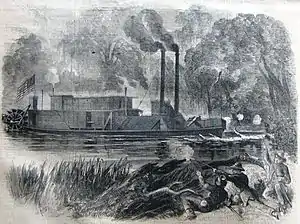 USS Barataria snagged in Amite River | |
| History | |
|---|---|
| Laid down | date unknown |
| Launched | date unknown |
| Acquired | January 1, 1863 |
| In service | circa January 1863 |
| Out of service | April 7, 1863 |
| Stricken | 1863 (est.) |
| Captured |
|
| Fate | Scuttled, April 7, 1863 |
| General characteristics | |
| Displacement | 400 tons |
| Length | 125 ft (38 m) |
| Beam | not known |
| Draught | 3 ft 6 in (1.07 m) |
| Propulsion |
|
| Speed | not known |
| Complement | not known |
| Armament | two 24-pounder howitzers |
| Armour | ironclad |
The first USS Barataria was a steamer captured by the Union Army during the American Civil War. She was used by the Union Navy as a gunboat in support of the Union Navy blockade of Confederate waterways.
Barataria captured by the Union Army and placed into Union Navy service
Barataria, an ironclad gunboat, was seized by the Union Army at New Orleans, Louisiana, shortly after Flag Officer David Farragut's task force from the West Gulf Blockading Squadron captured that city on April 25, 1862. The Union Army used the steamer through the end of the year and transferred her to the Navy on January 1, 1863.
Modified for Louisiana coastal and inland operations
The steamer was outfitted at New Orleans and armed with two 24 pounder howitzers so that she might serve as a gunboat in the shallow inland waters of Louisiana—such as Lake Borgne, Lake Pontchartrain, and Lake Maurepas.
Although few records of her service have survived, it seems that Barataria was used primarily to support operations of Army troops commanded by Major General Godfrey Weitzel in Louisiana's coastal inland waters.
Barataria strikes a snag in the river, is attacked by Confederates
While on such a mission, the gunboat commanded by Acting Ensign James F. Perkins struck a snag in Lake Maurepas at the mouth of the Amite River early on the morning of April 7, 1863. Throughout that day, her small crew assisted by Union soldiers of the 6th Michigan Volunteers fought off Confederate guerrilla attacks while also jettisoning equipment to lighten ship. However, even sacrificing her bow gun and emptying her boiler failed to refloat Barataria by sunset.
Barataria is put to the torch to prevent capture while her crew escapes
Then, lest she fall into enemy hands, Perkins put the torch to the stranded stern wheeler; and her magazine exploded soon after all hands had escaped in small boats.
References
- This article incorporates text from the public domain Dictionary of American Naval Fighting Ships. The entry can be found here.